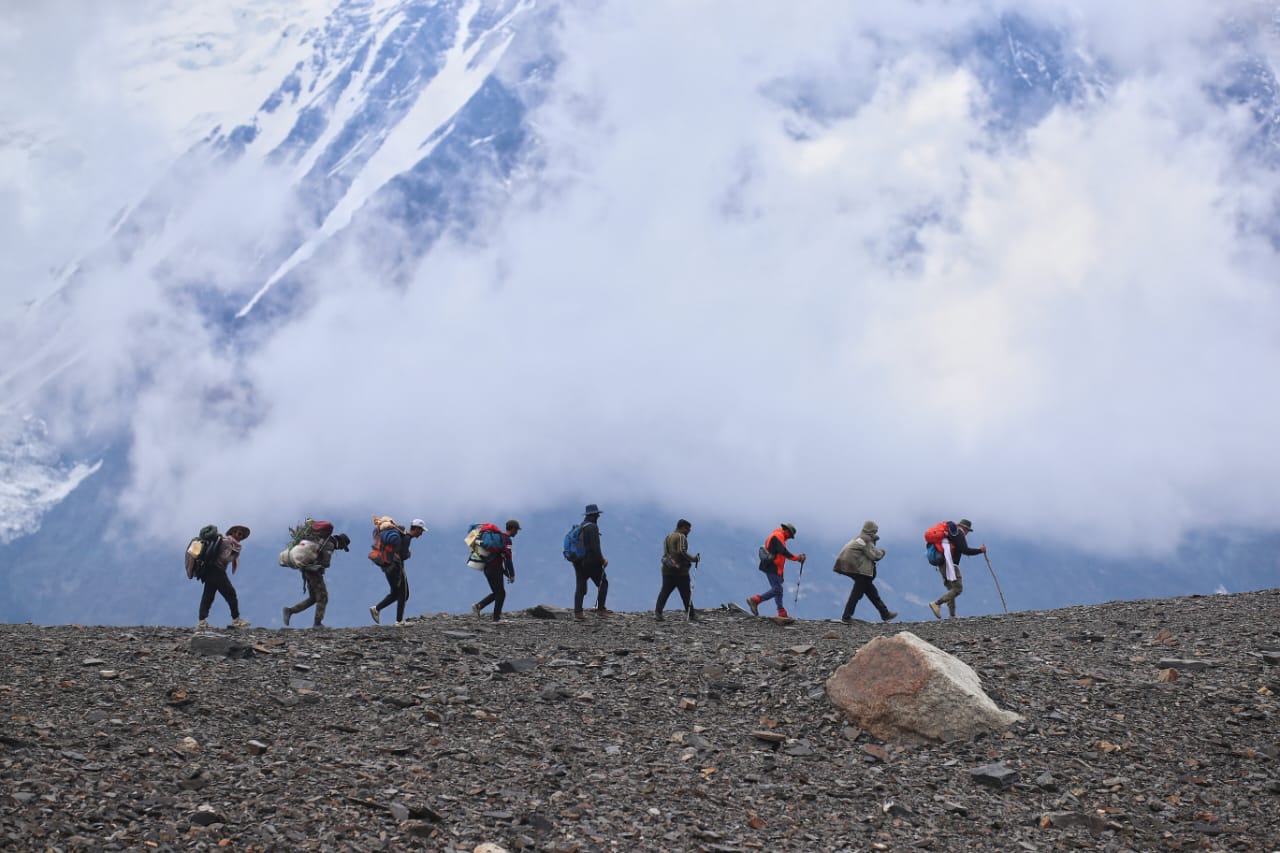Written By: Omer Arshid Khan
I suppose I need to get this off my chest. It has been a long time coming. The memory is still vivid—an old British man’s eyes scanning me from head to toe, his smug smirk cutting through the cold air as he asked where I was from. There was something in his tone, as if he knew more about my homeland than I ever could. It struck me like a slap, left me stunned and speechless. It was our last day, returning from K2 Basecamp. Two of us had chosen to take the Gondogoro La Pass, a towering 5,600-meter mountain that would shave three days off our return.
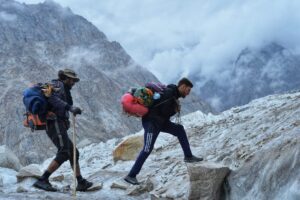
We were told it was deadly, that there would be no middle ground: either we would succeed, or we wouldn’t return at all. After trekking for seven hours from Concordia, we reached Ali Camp in the afternoon, exhausted and half-frozen. We slept as the camp was being set up, only to wake up in the evening to a sea of climbers and trekkers—the ones who had summited K2 two nights ago. That was when I saw him for the first time—a British man, nearing his 60s, haggling with porters over the price per kilo of extra baggage, clutching a manual weighing machine as though he belonged here more than we did.
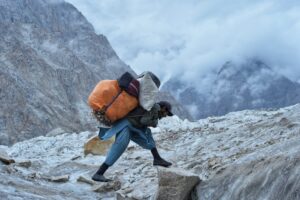
He had trail of young foreign climbers beside him. That night, we set off at 11:00 p.m. for the summit attempt, a snake-like line of climbers tied together by ropes, no room to pause, no room for error. Step by step, breath by labored breath, we moved in the pitch black of night, only headlamps cutting through the void. I somehow made it ahead of the line, leading the way upward, my hands numb on the ropes, my forearms screaming. At 3:30 a.m., we reached the summit of the pass, but there was no time to celebrate. We had just 15 minutes to switch our gear and begin the descent, a near-vertical drop, even more treacherous than the ascent. Loose rocks hurtled downwards, breaking the noses of two climbers, who— despite blood streaming down their faces—had no choice but to continue.
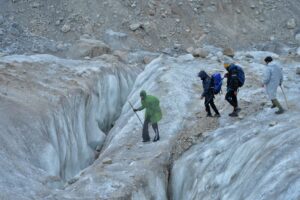
We had to make it through before dawn, before the sun awakened the mountains and unleashed the avalanches that would surely bury us alive. By 6:00 a.m., I reached the end of the fixed ropes, only to lose the trail completely. Alone and unsure, I stood still, my mind racing, when he appeared again—the same old British man. He motioned me to step aside, told me to follow him, and I did. When we finally reached safety at the bottom, I asked him how he knew the way. That was when he looked at me again with that same piercing gaze. “Where are you from?” he asked. “Pakistan,” I said softly. “Born and raised.” “Which city?” “Abbottabad.” He chuckled lightly. “Ah, yes… since they built the motorway bypassing the city, I don’t get to visit as often. But I practically live in Pakistan. It’s my second home. I’ve been bringing groups here for over 25 years. And only recently, in the last couple of years, have I started seeing Pakistanis out here in the high mountains.
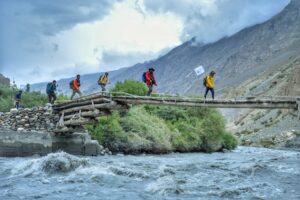
Finally… you people are beginning to own your mountains.” His words seared straight into my heart. He was right. For decades, our mountains have been owned, climbed, and celebrated by Europeans, Japanese, Chinese, Koreans—everyone but us. After 75 years of independence, we still had not produced a truly great mountaineer, someone who could lay claim to these peaks as our own. Last year, having been posted as Director in Culture & Tourism Authority, I was reminded of this promise I made to myself 3 years ago. That conversation returned to me like an echo from the mountains. To reclaim our mountains_ that was the call. Tirich Mir—the highest peak of the Hindu Kush, standing at 7,705 meters—was declared the icon of Khyber Pakhtunkhwa.
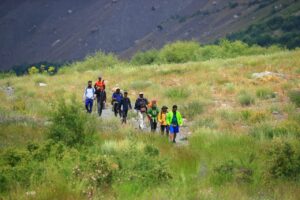
By 1950, this was the highest that humans have climbed. Mount Everest was later conquered in 1952. This was the true mark of human endeavor and to celebrate its 75th anniversary, Government of Khyber Pakthunkhwa declared 2025 as the year of Tirich Mir and approved 100 million to celebrate this year. When I saw the plan to “celebrate” it with symposiums, exhibitions, and formalities in distant cities, I knew I could not let that happen. This was not the time for polite words and banquets. The only way to celebrate “summit” is by climbing. This was a time for footsteps on the mountain. For adventure. For courage. For reclaiming what is ours. I fought to divert the entire budget toward trekking and mountaineering expeditions—to build a culture, to plant a seed that would grow into something bigger than ceremonies ever could. Because the truth is, no Pakistani has ever conquered Tirich Mir. It is our mountain, yet we stand as strangers at its feet. For 75 years, we have looked up in awe, never daring to reach the summit.
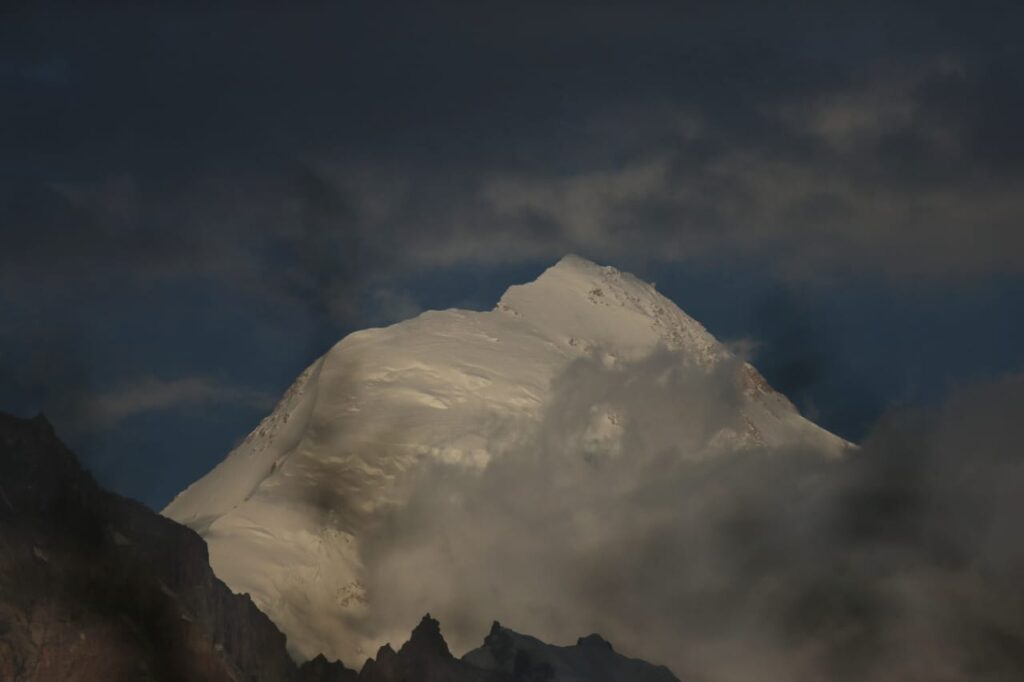
This initiative—three basecamp expeditions, including one solely for women, culminating in a final summit attempt—is about more than one climb. It is about showing the world that we can. That our people can train, equip, and lead. That young Pakistanis can capture the emerging global market for adventure tourism rather than watching others profit off our homeland. Mountaineering is a deadly sport, yes. But the world has changed. Modern equipment, oxygen systems, and expertise have made these climbs accessible not only to professionals but to those who wish to taste the extreme, just once, before returning home with a story that will echo for generations.
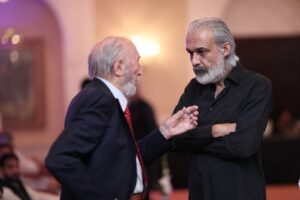
This is an opportunity for us. A gold mine hidden in plain sight. Through these expeditions, local porters, cooks, and guides—people who have lived their entire lives in the shadows of these mountains—are earning livelihoods and gaining experience.
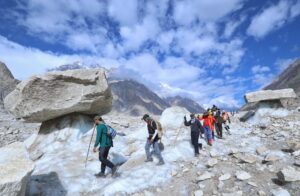
From them will rise the future high-altitude porters and adventure companies that will take Pakistan forward. This is just the beginning, a spark to ignite a fire. Western companies charge the starting price of 35,000 dollars per person for Mount Everest and K2 climbs. Normal price goes much higher and hovers around 50,000 dollars per person. Except porters, none of this money lands in either Nepal or Pakistan. Even in that quarter, Nepal takes the lead, where western companies prefer Nepali sherpas to Pakistani porters. Except Porters with their per kg per km regulated weight , all of this money is being exchanged in foreign countries. All of high-altitude equipment is being made by foreign companies and it is among one of the costliest adventure sports in the world.
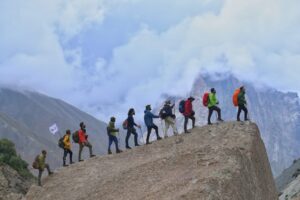
That British Tour Operator is cashing out our very own mountain and has made a living out of it for over 25 years. It’s his entire career to bring young enthusiasts to Pakistan and have them climb one of our mountains.
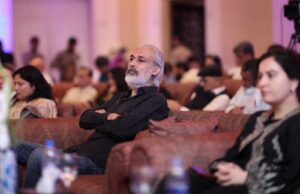
He’s charging each of these participants in pounds, dollars and euros. If we had been able to do it, this money would have turned out in our own hands. But we have not yet been able to build up that trust level where an adventurer would trust us with their lives. Thats the whole point. To be able to build up this level of trust among our own people. Bringing to Pakistan the level of expertise and technical skill. We would have cost lot less for such an adventure, if we had been able to build up our own economy around this game. And to be able to sow this seed is my own personal adventure.
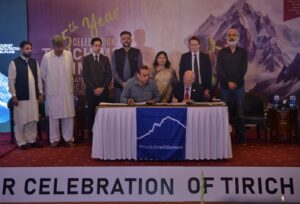
Beyond the call of duty, I would go ahead and lead this summit attempt myself. Pakistan’s very own Mr. Sirbaz Khan_ already a great name in the mountaineering community_ has been hired to guide this expedition to the top. This is because you got to lead from the front. You cant expect others to dream, while you don’t dare.
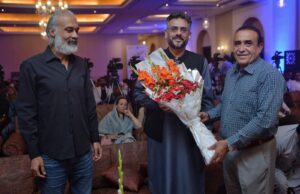
To climb Tirich Mir is not about glory or fame. It is about planting a flag in our own hearts, telling ourselves and the world that these mountains are not just backdrops to foreign climbers’ stories. They are ours. Well, this is Pakistan’s very own Summit Expedition, and it can go many ways.

Mountaineering is a deadly sports and probability of its failure is always very high. It may be remembered that the spirit of those who have dared will not fall into silence. It will remain etched in the frozen winds of Tirich Mir, whispering to every climber who sets foot on its slopes. For these mountains are not merely stone and snow—they are the spines of our identity, the quiet keepers of our history, the guardians of a dream we have yet to fulfill. This is but one small step to reclaim what is rightfully ours. The mighty mountain calls at last, and the Government of Khyber Pakhtunkhwa has risen to answer its timeless summons. And that, perhaps, is reason enough to climb.

